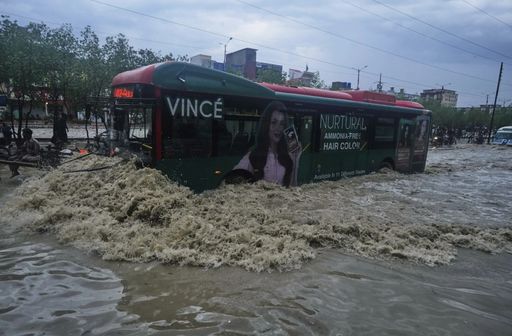Constant rains and raging floods in northern Pakistan have already destroyed a large chunk of infrastructure and agricultural lands, including hundreds of houses, roads, and bridges, and washed away livestock.
The battered people are now facing an even worse ordeal, the outbreak of waterborne and other diseases, in addition to psychological trauma.
The expected outbreak has prompted the government health authorities and non-governmental relief organisations to set up makeshift clinics and medical camps, mainly across northwestern Khyber Pakhtunkhwa province, to cope with the massive outbreaks of several waterborne and skin diseases.
Rains and flood-related accidents have already killed more than 400 people across the province since August 15, according to the provincial disaster management authority.
"Post-floods situation is even more dangerous as the lurking threat of outbreak can kill more people than floods did," warned Dr. Abdul Ghafoor Shoro, the secretary general of Pakistan Medical Association, a nationwide body of medical professionals.
Speaking to Anadolu, Shoro called for an immediate "prevention plan" involving the provision of basic health necessities, including clean drinking water and hygiene, to mitigate the danger.
"Considering the given hygiene conditions, we cannot fully contain the outbreak and possible deaths, but a smart prevention plan can reduce the volume of a secondary disaster to a good extent," he maintained.

Thousands stranded
Dr. Mohammad Zahid Latif, head of the health division of Al Khidmat Foundation, one of the country's largest non-governmental relief organisations, said that waterborne and skin diseases are already on the rise in the flood-stricken areas.
"Thousands of people, mainly children, have arrived with complaints of diarrhoea, gastroenteritis, dengue fever, malaria, and skin issues. Thousands more (with similar complaints) are still stranded on the outskirts due to the blockade of roads and washing away of bridges," he told Anadolu.
Reproductive and mental health requirements are another major issue, which the affected population is battling with, Latif pointed out.
"Many affected people have been brought to us with severe trauma and stress disorder because of the disaster they have gone through," he said, fearing that the physical pain and injuries will heal in weeks or months, but the mental trauma will take a long time to go away.
Endorsing the view, Ataullah Khan, a spokesman for the provincial health department, said the government has already started steps to contain the problem.
"In addition to communicable diseases, people are also facing trauma and acute stress disorder. To handle the issue, the provincial government has sent trained psychiatrists to the flood-hit areas in collaboration with psychiatrist associations," Khan told Anadolu.




















